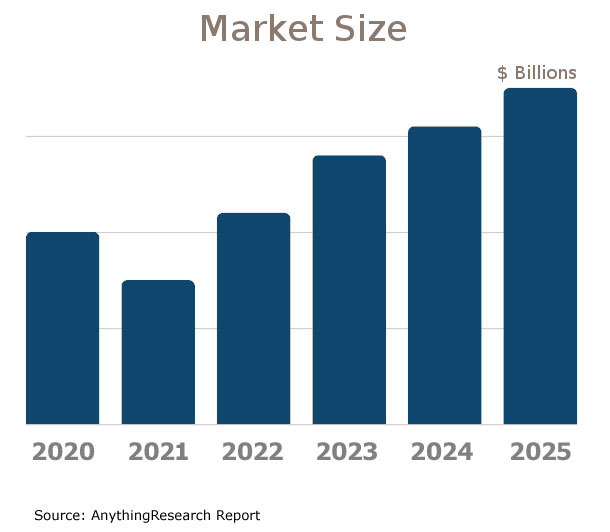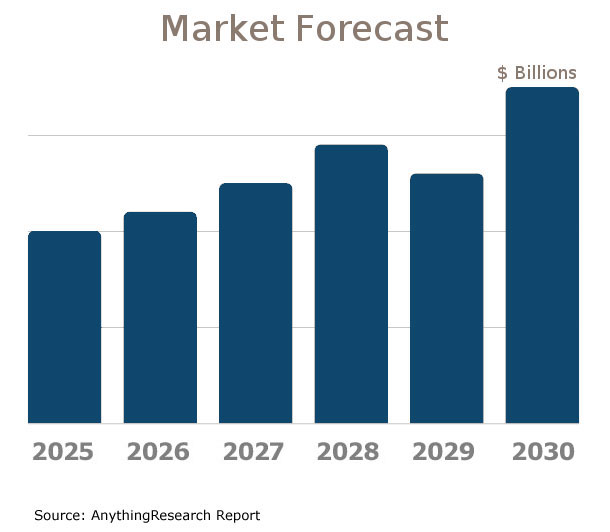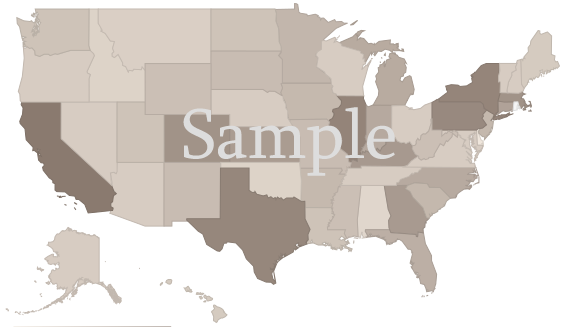| Standard Report | Premium Report | |
|---|---|---|
| Current State of the Industry |  |
 |
| Market Size (industry trends) |  |
 |
| Market Forecast (5-year projection) |  |
|
| Products/Services Breakdown |  |
|
| Revenue per State |  |
 |
| Financial Metrics |  |
 |
| Salary & Compensation Statistics |  |
 |
| Public Company Information |  |
 |
| Key Private Companies |  |
|
| Government Vendors |  |
|
| Instant Download - Available immediately upon purchase |  |
 |
Download both PDF and Excel


|
 |
 |
| Download now: |


2026 U.S. Industry Statistics & Market Forecast - Outpatient Mental Health and Substance Abuse Centers
Market Size & Industry Statistics
The total U.S. industry market size for Outpatient Mental Health and Substance Abuse Centers:
Industry statistics cover all companies in the United States, both public and private, ranging in size from small businesses to market leaders.
In addition to revenue, the industry market analysis shows information on employees, companies, and average firm size.
Investors, banks, and business executives use growth rates and industry trends to understand the market outlook and opportunity.

| Statistics | 2020 2021 2022 2023 2024 2025 | |
|---|---|---|
| Market Size (Total Sales/Revenue) |
Order at top of page | |
| Total Firms | ||
| Total Employees | ||
| Average Revenue Per Firm | ||
| Average Employees Per Firm | ||
| Average Revenue Per Employee | ||
Market Forecast
Market forecasts show the long term industry outlook and future growth trends. The following extended five-year forecast projects both short-term and long-term trends.

| Forecast / Industry Outlook | 2025 | 2026 | 2027 | 2028 | 2029 | 2030 |
|---|---|---|---|---|---|---|
| Market Forecast ($ millions) | ||||||
| Projected Industry Growth Rate (%) | ||||||
Industry Insights
Major trends affect the Outpatient Mental Health and Substance Abuse Centers industry include:- Increased demand for mental health and substance abuse services
- Integration of telepsychiatry and telehealth services
- Rising healthcare costs and impact on service accessibility
- Greater emphasis on personalized and patient-centered care
- Expanding insurance coverage under healthcare reforms
- Growing recognition and treatment of dual diagnoses
- Increasing use of data analytics for outcome improvement
- Shift towards evidence-based therapies
- Impact of opioid epidemic on service demand
- Stigma reduction around mental health and substance use disorders
- Regulatory changes affecting service provision and reimbursement
- Technological advancements in treatment and diagnostic tools
- Shortage of qualified mental health professionals
- Collaboration between primary care and mental health services
- Rising public awareness and education on mental health and substance abuse
Product & Services Breakdown
Research products and services in the Outpatient Mental Health and Substance Abuse Centers industry generating sales. Note that products are broken into categories with different levels of classification.| Product Description | Number of Companies | Sales ($ millions) | Percent of Total Sales |
|---|---|---|---|
Industry Total |
|||
Patient Care, Related To Icd-9 Major Category, Based On Primary Diagnosis |
|||
Patient Care - Mental Disorders (Icd-9 Codes 290-319) |
|||
Patient Care - Supplementary Classification Of Factors Influencing Health Status And Contact With Health Services (Icd-9 Codes V |
|||
Contributions, Gifts, And Grants - Government |
|||
Contributions, Gifts, And Grants - Private |
|||
All Other Revenue |
|||
U.S. Geographic Distribution: Revenue Statistics by State
Market Size by State ($ millions) indicates how the industry's competition is distributed throughout the country. State-level information can identify areas with higher and lower industry market share than average.
Income Statement (Average Financial Metrics)
Financial metrics provide a snapshot view of a benchmark "average" company. Key business metrics show revenue and operating costs. The data collected covers both public and private companies.| Industry Average | Percent of Sales (Industry Benchmark) |
|
|---|---|---|
| Total Revenue | Order at top of page |
|
| Operating Revenue | ||
| Cost of Goods Sold | ||
| Gross Profit | ||
Operating Expenses | ||
| Pension, profit sharing plans, stock, annuity | ||
| Repairs | ||
| Rent paid on business property | ||
| Charitable Contributions | ||
| Depletion | ||
| Domestic production activities deduction | ||
| Advertising | ||
| Compensation of officers | ||
| Salaries and wages | ||
| Employee benefit programs | ||
| Taxes and Licenses | ||
| Bad Debts | ||
| Depreciation | ||
| Amortization | ||
| Other Operating Expenses | ||
| Total Operating Expenses | ||
| Operating Income | ||
| Non-Operating Income | ||
| EBIT (Earnings Before Interest and Taxes) | ||
| Interest Expense | ||
| Earnings Before Taxes | ||
| Income Tax | ||
| Net Profit Net Income | ||
Financial Ratio Analysis
Financial ratio information can be used to benchmark how a Outpatient Mental Health and Substance Abuse Centers company compares to its peers. Accounting statistics are calculated from the industry-average for income statements and balance sheets.| Profitability & Valuation Ratios | Industry Average |
|---|---|
| Company valuation can be measured based on the firm's own performance, as well as in comparison against its industry competitors. These metrics show how the average company in the Outpatient Mental Health and Substance Abuse Centers industry is performing. | |
| Profit Margin Gross Profit Margin, Operating Profit Margin, and Net Profit Margin. Show company earnings relative to revenues. |
|
| Return on Equity (ROE) Return on Equity (ROE) is net income as a percentage of shareholders' equity. Shareholders' Equity is defined as the company's total assets minus total liabilities. ROE shows how much profits a company generates with the money shareholders invested (or with retained earnings). |
|
| Return on Assets (ROA) Return on Assets (ROA) is net income relative to total assets. The market research on Outpatient Mental Health and Substance Abuse Centers measures how efficiently the company leverages its assets to generate profit. ROA is calculated as Net Income divided by Total Assets. |
|
| Liquidity Ratios | Industry Average |
|---|---|
| Bankers and suppliers use liquidity to determine creditworthiness and identify potential threats to a company's financial viability. | |
| Current Ratio Measures a firm's ability to pay its debts over the next 12 months. |
|
| Quick Ratio (Acid Test) Calculates liquid assets relative to liabilities, excluding inventories. |
|
| Efficiency Ratios - Key Performance Indicators | Industry Average |
|---|---|
| Measure how quickly products and services sell, and effectively collections policies are implemented. | |
| Receivables Turnover Ratio If this number is low in your business when compared to the industry average in the research report, it may mean your payment terms are too lenient or that you are not doing a good enough job on collections. |
|
| Average Collection Period Based on the Receivables Turnover, this estimates the collection period in days. Calculated as 365 divided by the Receivables Turnover |
|
| Inventory Turnover A low turnover rate may point to overstocking, obsolescence, or deficiencies in the product line or marketing effort. |
|
| Fixed-Asset Turnover Generally, higher is better, since it indicates the business has less money tied up in fixed assets for each dollar of sales revenue. |
|
Compensation & Salary Surveys for Employees
Compensation statistics provides an accurate assessment of industry-specific jobs and national salary averages. This information can be used to identify which positions are most common, and high, low, and average annual wages.| Title | Percent of Workforce | Bottom Quartile | Average (Median) Salary | Upper Quartile |
|---|---|---|---|---|
| Management Occupations | 8% | Order at top of page |
||
| Chief Executives | 0% | |||
| General and Operations Managers | 1% | |||
| Other Management Occupations | 5% | |||
| Community and Social Service Occupations | 50% | |||
| Counselors, Social Workers, and Other Community and Social Service Specialists | 50% | |||
| Counselors | 30% | |||
| Substance Abuse, Behavioral Disorder, and Mental Health Counselors | 25% | |||
| Social Workers | 12% | |||
| Mental Health and Substance Abuse Social Workers | 8% | |||
| Miscellaneous Community and Social Service Specialists | 8% | |||
| Social and Human Service Assistants | 7% | |||
| Healthcare Practitioners and Technical Occupations | 14% | |||
| Healthcare Diagnosing or Treating Practitioners | 8% | |||
| Health Technologists and Technicians | 6% | |||
| Office and Administrative Support Occupations | 14% | |||
Outpatient Mental Health and Substance Abuse Centers Competitor Landscape & Key Companies [PREMIUM]
The most influential companies in the Outpatient Mental Health and Substance Abuse Centers industry and adjacent industries either have large market share or are developing new business models and methods that could disrupt the status quo. We look at leading and emerging companies in the Outpatient Mental Health and Substance Abuse Centers industry and adjacent sectors:| Market Leaders: Direct Competitors Companies with the largest market share, focused in this industry |
Market leaders: Diversified Competitors Largest companies that have diversified operations in this and other industries |
| Innovators: Direct Competitors Innovative, Emerging, and Disruptive Companies that may influence the future direction of the industry. |
Innovators: Diversified Competitors Innovators and Disruptors in adjacent industries that may also affect the Outpatient Mental Health and Substance Abuse Centers industry. |
Latest Industry News
- Ronayne seeks $7M in opioid settlement dollars for new mental health, addiction center on former St. Vincent campus - Executive Chris Ronayne is proposing to use opioid settlement funds to help create a first-of-its-kind drop-in crisis center at the St. Vincent campus, opening in 2026. (07/08/2025)
- Cuyahoga County to allocate $7M for new behavioral health center in Cleveland's Central neighborhood - Cuyahoga County will use $7 million from opioid settlements to build a "first-of-its-kind" behavioral health crisis center set to open in September 2026. (07/07/2025)
- The tender shoots of a behavioral health rebound - The closure of West Springs Psychiatric Hospital has undoubtedly put more strain on the rest of the behavioral health system in western Colorado, but it’s also forced local officials to (07/05/2025)
- Sen. James and Rep. Moses Fight to Bring Mental Health Treatment Back to the Chippewa Valley - My colleagues and I have been working for multiple sessions to get more mental health beds in the Chippewa Valley,” said Senator James. (07/01/2025)
- Access: Supports for Living offers peer assistance for those with mental health, substance use issues - Peer support is an integral part of what Access: Supports for Living, has to offer, a spokesperson for the mental health and substance use urgent care organization said recently. (06/29/2025)
- Iowa’s mental health system is about to change, again. What to expect - Advocates of the change hope it will improve access to services and better coordination of care, by combining Iowa’s 32 disparate mental health and substance use regions into seven unified behavioral health districts, while placing disability services under the jurisdiction of the Iowa Department of Health and Human Services. (06/29/2025)
- New clinic on St. Paul’s East Side expands mental health and substance abuse services for kids - Wilder East Clinic extends the Wilder Foundation’s services with improved access and culturally specific approaches. (06/28/2025)
- UMC, Clark County join forces to open mental health center - UMC Crisis Stabilization center provides 24/7 behavioral crisis interventions, regardless of patient’s insurance status. (06/26/2025)
- New York State Health Foundation: Integrating Mental Health and Substance Abuse Care | Health Affairs - The center’s goal: provide hands-on assistance in implementing best practices to at least half of the state’s 1,200 mental health and substance abuse treatment clinics. (06/19/2025)
- New Green Valley center expands mental health, addiction care in rural Arizona - KGUN 9 - Additional resources to treat substance abuse and mental health issues include: Community Bridges, Inc. (Tucson and statewide) Crisis stabilization, residential treatment, and outpatient services. (06/10/2025)




